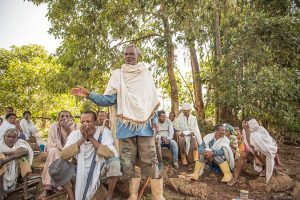
The young man whose name I withhold in this story, is probably in his late twenties, tall, handsome with curly hair that he had made in Rasta dreads that fall down his neck. The day I met him, he was walking to the local market with an elderly Chinese woman who was carrying a big straw bag for shopping. This particular vegetable market at the centre of this budding town of Dukem daily accommodates Chinese customers who came there for their daily shopping sprees. Those are the workers from the Eastern Industrial Zone, a sprawling industrial town in its own right.
The young man in this story was accompanying the elderly Chinese women assisting and serving her private translator from Chinese to Afan Oromo or Amharic in their interactions with the vegetable sellers. The young man and the elderly Chinese woman stopped at one of the stalls that sell all kinds of vegetables ranging from garlic to carrots, to potatoes to beetroots. The Chinese woman was speaking to the young man while he was translating to the seller in Afan Oromo. The communication was going smoothly and the shopping was successful. The Chinese woman settled the bills and continued her walk with the young man by her side.
It was my first time to encounter Chinese living in Dukem town using private translators in their day to day communication with the local people for various reasons. What caught my attention was the young translator who was using a foreign language as his breadwinner as a private translator. I asked the vegetable seller whether there are many translators who come for shopping accompanying their Chinese employers.
“There are many youngsters who work as translators for the Chinese!” the vegetable seller told me, with an excitement that hid the smile that was struggling to leave her lips. I learned from the same seller that these young men had learned Chinese while they were working at the industrial zone where they took Chinese language lessons at the same time. Some of the youngsters have left their jobs to work as translators for Chinese housewives or any other Chinese national working and living in the same town. I also learned that working as translator has its advantage because the translators are well paid by their employers, far exceeding the wage levels at factories in the industrial zone. “They are paid two or three times higher than the wages at the factories!” the same vegetable sellers related to me. I realized that that was a smart way of earning one’s bread in these tough times when jobs are hard to come by an wages are low due to the sharp competition and the availability of a large pool of potential workers who accept any job for any wage.
This revelation about Chinese translators brought to my mind memories of the translators I used to meet in the streets of Addis back in my school days. Those translators often accompanied foreign tourists on their journey to various parts of the Ethiopian capital where they paid visits to various places, go shopping at the old and famous market, known as the biggest open air market in Africa” where tourists and locals brushed shoulders exchanging only broad smiles and friendly gestures. Language was a great barrier and communication was superficial, limited to “hello!” or “how are you?”. The young translators who accompanied the tourists where
Speaking one or two foreign languages and Western languages for that matter, is a great blessing in many African countries. The era of considering European languages as the languages of “the enemy” or that of colonialism is now gone for good. In this time of fast technological advances, knowledge of a foreign language is a key that opens many opportunities.
In this time of fast development in cyber technology, knowledge of English, French, or any European language is a great asset not only in education and knowledge seeking but also in the day to day life, particularly among those youngsters who are facing the vicissitudes of joblessness.
According to reliable sources, there are between 1000 and 2000 languages in use or spoken across Africa. Most of the languages have no written scripts. Some of them have but have not yet developed enough to grow into literary languages. They rather use their national languages or some foreign language, French, Portuguese or French as language of oral and written communication. This does not however mean that the oral languages will not develop into generating their own scripts.
However, the focus here is on the increasing interest among many Africans to learn Western languages as a means of education or employment as the case of the young man in Dukem in our story. The opposing trend is however for Europeans, Chinese, Japanese, Russians and people from other industrialized countries to learn African languages.
This a recent trend born of the growing economic, political and cultural ties between these countries and Africa that has become the economic hub for many foreign businesses who have already opened shops in many African capitals. Geopolitical interests hat bring foreigners to the continent of Africa where economic and other opportunities are still largely available. The foreigners who are interested in African languages may not know that the continent is not only ethnically diverse but also linguistically rich.
According to recent data, the number of languages spoken within the African continent range between 1000 and 2000. “Africa is home to approximately one-third of the world’s languages. The diversity of African languages is evidenced by their populations.” The same data indicates that the major African languages are, in order of importance, Swahili which has between 100 and 150 million speakers. Second place is occupied by Hausa alongside Yoruba are two Nigerian languages that are spoken in more countries, especially Yoruba spread out during the European conquests and all to Brazil.
According to another data, the most widely spoken languages in Africa are, Swahili, Arabic, French, Hausa, Yoruba and Afan Oromo. Arabic and French are not African languages or native languages as such but came to the continent following the spread of Islam in the first case and that of colonialism in the case of French. The French conquered almost half of Africa and their language is still spoken by many countries in West Africa in particular. The same data maintains that “30 million people in Africa speak Yoruba. It is spoken in everyday life, especially in Nigeria Togo and Benin but also in Ghana, the Ivory Coast, Sierra Leone, and Liberia. Just that many people in Africa speak Afan Oromo which is particularly widespread in Kenya, Ethiopia, Egypt and Somalia.”
Europeans and foreigners in general are displaying a growing interest to study African languages although the objective or purpose of such study has drastically changed. Modern Europeans and also Americans want to study or know one or two African languages, for their personal consumption. According to one view, “Learning an African language will allow you to engage more deeply with African movies, TV shows and music. Learning an African language will allow you to engage more deeply with the music by dissecting the lyrics-opening a whole world of cultural. Socio-political critique and storytelling.” The approaches to the study of African languages is thus different then and now.
What is more impressive nowadays is the fact that an increasing number of European as well as Asian countries, i.e. the Chinese and the Japanese in particular, are keen to understand or speak at least one African language both at the personal level and as inter-cultural exchange and understanding at the official level. For our purpose here, we turn to two major countries that are particularly interested in African languages such as Amharic, Swahili and Yoruba to name but only three of them. Economics, geopolitics and culture may be involved in this new quest at varying degrees but it nevertheless remains true that these countries are showing a new interest in African languages although Africans may not reciprocate this by learning the European or Asian languages.
Interests among young Africans in learning European or foreign or foreign language is growing slowly while the trigger is always economic one. Hundreds of thousands of Africans are trying to learn foreign languages to realize their dreams of going to those countries seeking job or employment opportunities. There are also many idealists among young Africans who regard or dream about the West as a place where milk and honey are flowing and life would look like heaven on earth. Yet, this is far from the truth. Western countries, like Africa, are still struggling with their economic and social problems and life is not as ideal as many dreaming Africans might think. Even the young Africans who migrate to Arab countries that are sometimes portrayed ‘Eldorado in the desert’ are disappointed by the kind of life they encounter there.
The young translator we portrayed above in this story might also be one of the young African dreamers who would migrate to any country where opportunities for, education work and a better life might be awaiting them. It may be in Beijing or elsewhere in Asia or a stint in any European country. In the mind of all young African dreams, language of a foreign language must be projected as the most important asset that ill sooner or later change their lives to the better. This is a welcome that is bound to grow in the coming few years as many young Africans would be inspired by their friends who have already made it to Europe or America or as far as Australia. We may perhaps portray this trend as the outcome of the ongoing ‘demographic globalization’.
BY MULUGETA GUDETA
THE ETHIOPIAN HERALD FRIDAY 6 DECEMBER 2024




